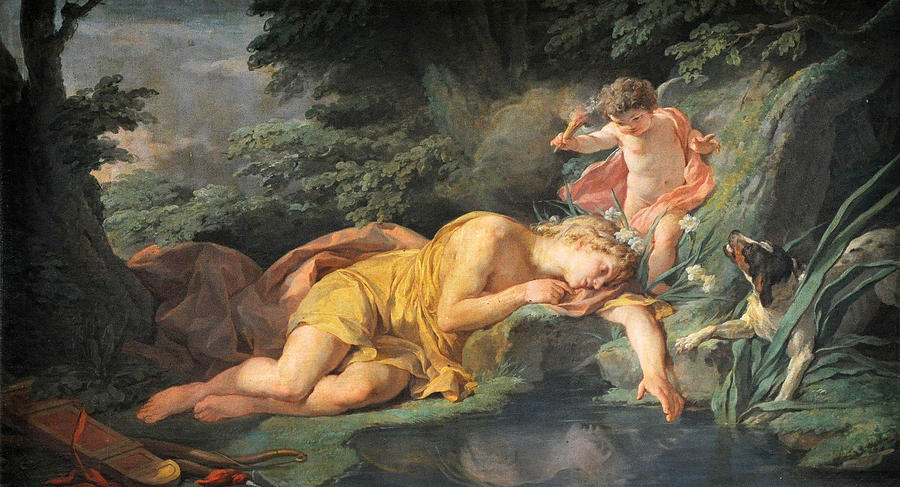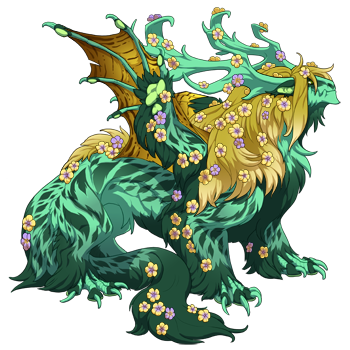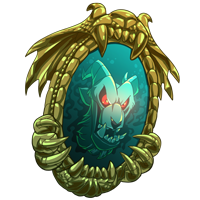

Narcissus
(#66579045)
may he who loves not others love only himself
Click or tap to view this dragon in Predict Morphology.
Energy: 37/50

Expand the dragon details section.
Collapse the dragon details section.
Personal Style

Ancient dragons cannot wear apparel.
Skin
Scene

Measurements
Length
10.47 m
Wingspan
5.89 m
Weight
7863.21 kg
Genetics
Jade
Phantom (Gaoler)
Phantom (Gaoler)
Lemon
Striation (Gaoler)
Striation (Gaoler)
Banana
Blossom (Gaoler)
Blossom (Gaoler)
Hatchday
Breed
Eye Type
Level 1 Gaoler
EXP: 0 / 245


STR
7
AGI
5
DEF
7
QCK
5
INT
5
VIT
9
MND
7
Biography

[ Narcisse changé en fleur by Nicolas Bernard Lepicie, 1771 ]



Narcissus
Νάρκισσος, Nárkissos
I grow numb

In Greek mythology, Narcissus was a hunter from Thespiae in Boeotia who was known for his beauty. According to Tzetzes, he rejected all romantic advances, eventually falling in love with his own reflection in a pool of water. He later died, and in his place sprouted a flower bearing his name.
The name is of Greek etymology. According to R. S. P. Beekes, "[t]he suffixes... clearly points to a Pre-Greek word." The word narcissus has come to be used for the daffodil, but there is no clarity on whether the flower is named for the myth or the myth for the flower, although Pliny the Elder wrote that the plant was named for its fragrance (ναρκάω / narkao, "I grow numb") not the youth.
Several versions of the myth have survived from ancient sources, with slightly different variations. In some versions, Narcissus was the son of the god of the river Cephissus and nymph Liriope, while Nonnus instead has him as the son of the lunar goddess Selene and her mortal lover Endymion. The classic version by Ovid, found in Book 3 of his Metamorphoses begins with the story of Echo and Narcissus. When Liriope gave birth to the handsome child Narcissus, she consulted the seer Tiresias, who predicted that the boy would live a long life only if he never discovered himself. One day Narcissus was walking in the woods when Echo, an Oread (mountain nymph) saw him, fell deeply in love, and followed him. Narcissus sensed he was being followed and shouted "Who's there?". Echo repeated "Who's there?" She eventually revealed her identity and attempted to embrace him. He stepped away and told her to leave him alone. She was heartbroken and spent the rest of her life in lonely glens until nothing but an echo sound remained of her. Nemesis, the goddess of revenge, noticed this behaviour after learning the story and decided to punish Narcissus. Once, during the summer, he was getting thirsty after hunting, and the goddess lured him to a pool where he leaned upon the water and saw himself in the bloom of youth. Narcissus did not realize it was merely his own reflection and fell deeply in love with it, as if it were somebody else. Unable to leave the allure of his image, he eventually realized that his love could not be reciprocated and he melted away from the fire of passion burning inside him, eventually turning into a gold and white flower.
An earlier version ascribed to the poet Parthenius of Nicaea, composed around 50 BC, was discovered among the Oxyrhynchus papyri at Oxford. Unlike Ovid's version, Parthenius' version ended with Narcissus losing his will to live and committing suicide. A version by Conon, a contemporary of Ovid, also ends in suicide. In his version, a young man named Ameinias falls in love with Narcissus, who has already spurned his male suitors. Narcissus also spurns him and gives him a sword. Ameinias committs suicide at Narcissus's doorstep, and prays to the gods to give Narcissus a lesson for all the pain he has caused. Narcissus later walks by a pool of water and decides to drink, only to see his reflection, become entranced by it, and kill himself because he can never have the object of his desires. A century later the travel writer Pausanias recorded a novel variant of the story, in which Narcissus falls in love with his twin sister rather than himself. In all versions, his body disappears and all that is left is a narcissus flower.
Because Narcissus did not receive a proper funeral, he had no coin to pay Charon the ferryman for passage across the river Styx. Thus, it is said Narcissus can still be found admiring his reflection in the waters of the Styx, unable to cross over to the afterlife.
Hubris
Narcissus, Atlas, Tantalos, Sisyphos, Prometheus, Arachne

Narcissus, Atlas, Tantalos, Sisyphos, Prometheus, Arachne

Click or tap a food type to individually feed this dragon only. The other dragons in your lair will not have their energy replenished.
This dragon doesn't eat Insects.
Feed this dragon Meat.
This dragon doesn't eat Seafood.
Feed this dragon Plants.
Exalting Narcissus to the service of the Lightweaver will remove them from your lair forever. They will leave behind a small sum of riches that they have accumulated. This action is irreversible.
Do you wish to continue?
- Names must be longer than 2 characters.
- Names must be no longer than 16 characters.
- Names can only contain letters.
- Names must be no longer than 16 characters.
- Names can only contain letters.










